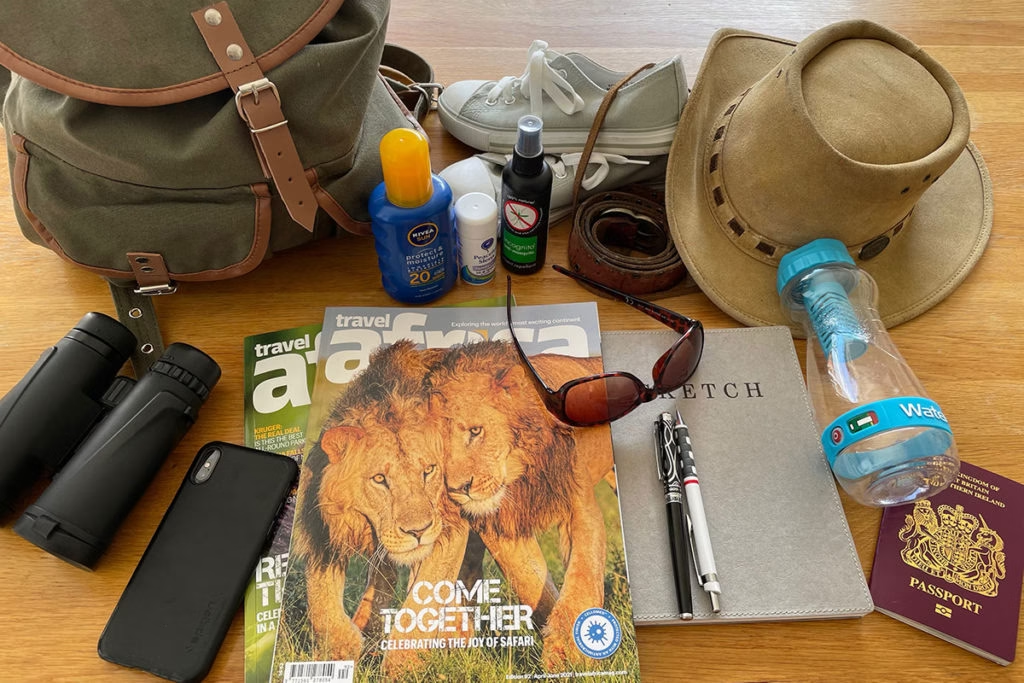10 Travel Tips When Going on an African Safari.
An African safari is an unforgettable experience, offering close encounters with wildlife, breathtaking landscapes, and unique cultural experiences. Proper preparation ensures that your adventure is enjoyable, safe, and enriching. Here are 10 essential travel tips for anyone planning an African safari.
1. Choose the Right Safari Destination
Africa offers a wide range of safari destinations, each with its own unique attractions. Decide what you want to see or experience—whether it’s the Big Five in Kenya’s Maasai Mara, gorilla trekking in Uganda, or the Serengeti’s Great Migration in Tanzania. Research the best times to visit, as wildlife viewing often depends on seasonal migrations and weather patterns.
 2. Pack Light but Smart
2. Pack Light but Smart
Pack clothing that is lightweight, breathable, and in neutral tones like beige, khaki, or olive to blend into the environment. Avoid bright colors, as they may scare off animals. Essentials include a wide-brimmed hat, sturdy walking shoes, sunscreen, insect repellent, and a lightweight jacket for chilly mornings and evenings. Don’t forget a good pair of binoculars and a camera to capture wildlife moments.
3. Get the Necessary Vaccinations and Medications
Consult a travel doctor well in advance of your trip to ensure you have all necessary vaccinations, such as yellow fever, typhoid, and hepatitis A and B. Malaria prophylaxis is essential in many African safari regions, so confirm if it’s required for your destination. Also, pack a basic first-aid kit for emergencies.
4. Prepare for Long Days in the Wild
Safari activities often start early in the morning or extend into the evening for the best wildlife viewing. Be prepared for long hours in a safari vehicle, which can be bumpy and dusty. Bring snacks, water, and a scarf or bandana to cover your face during dusty drives.
5. Respect Wildlife and Keep Your Distance
Always follow the guidance of your safari guide when observing wildlife. Stay quiet and avoid sudden movements that could startle animals. Never attempt to touch or feed the animals—this can be dangerous for both you and the wildlife. Remember, you are a guest in their habitat.
6. Embrace the “Safari Schedule.”
Safaris often operate on a set schedule with early wake-up calls, game drives, and designated meal times. Embrace the routine, as the early hours are when animals are most active and the light is perfect for photography. Use midday breaks to rest or enjoy the lodge’s amenities.
7. Stay Hydrated and Protect Yourself from the Sun
African safaris can be hot and sunny, so it’s essential to drink plenty of water to stay hydrated. Wear sunscreen with a high SPF, sunglasses, and a wide-brimmed hat to protect yourself from the sun’s intense rays.
8. Learn About the Local Culture
Africa is incredibly diverse, with rich traditions and cultures varying from region to region. Take time to learn about the local communities near your safari destination. Engage with locals respectfully and consider purchasing handmade crafts or souvenirs to support the community.
9. Bring Cash for Tips and Souvenirs
Tipping is customary on safaris, so bring cash in small denominations for guides, drivers, and lodge staff. US dollars are often accepted, but local currency may be preferred. Additionally, cash is useful for purchasing souvenirs or supporting local artisans in remote areas where card payments may not be available.
10. Be Patient and Stay Open-Minded
Wildlife viewing requires patience, as animals don’t always appear on command. Trust your guide, who knows the terrain and animal behavior well. Some of the most memorable moments on safari happen when you least expect them, so stay open to surprises and savor the journey.

